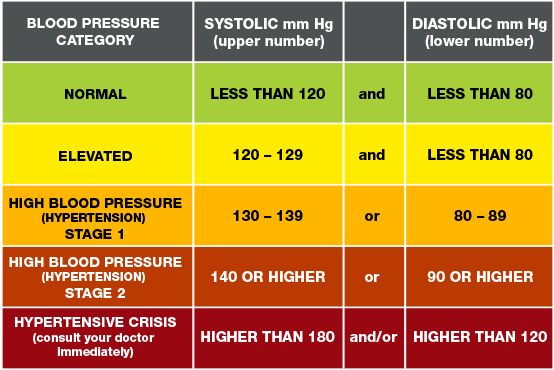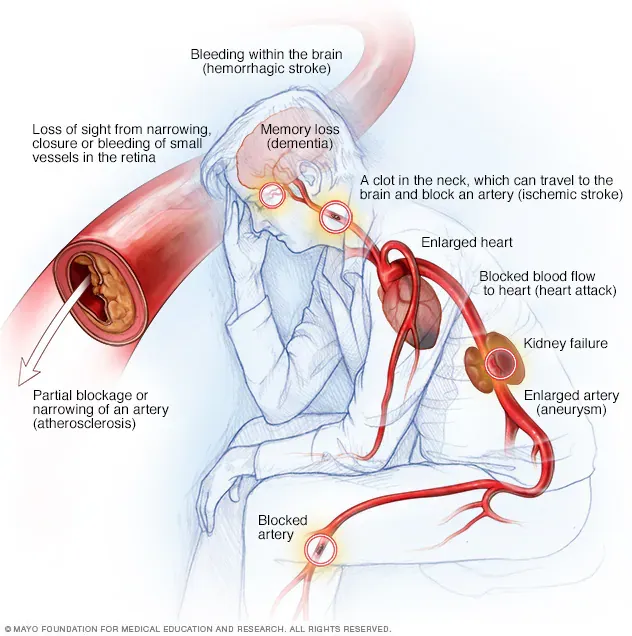What is high blood pressure?
This is a medical disease where the forces of pressure on the vessels in your body are too high, specifically, the arterial blood vessel. The arterial system carries oxygenated blood away from the heart to the entire body and organs, including the heart.
We measure blood pressure in mm of mercury (mm Hg) and it has two values. Systolic and diastolic blood pressure. The systolic number is a measure of the pressure in the vessel when the heart pumps and the diastolic is a measure of the pressure when the heart is at rest.
Guidelines exist to help you know if your blood pressure is too high so you can avoid bodily harm from elevated levels.
The American society for cardiology recommends an ideal blood pressure of 120/80 mmhg.

Why does it matter if pressures are too high?
If blood vessels sustain repeated damage over time, this disrupts the blood flow to the organs. Regrettably, when blood flow slows, delivering the precious cargo of oxygen becomes impossible. Without oxygen, the organ damage can become irreparable.
What happens to the body when our organs malfunction?
In the brain, lack of oxygen causes a stroke. Blood pressures which exceed normal to a severe level can rupture the smaller vessel. It leads to brain bleeding, inflammation, and swelling, possibly resulting in death without surgery.
The kidney is a special organ because it helps with regulating your blood pressure. With the help of hormones, it controls the amount of water and salt excretion, thus controlling your blood volume.
High blood pressure can damage this organ, causing a vicious cycle of worsening blood pressure. When kidney damage reaches the point of irreparable damage, you become dependent on dialysis for the rest of your life.
Your heart is one of the most important organs in your body. High pressures within the blood vessels of the heart can become damaged. Your body has this amazing way of healing, but the process it uses to heal within the blood vessels of the heart causes blockages. When this blockage completely occludes the vessel, this leads to a heat attack.

Causes of high blood pressure
Age: The older we get, the less elastic our blood vessels so this leads to higher pressures over time
Genetics: Certain ethnic groups families may have higher pressure than others
Gender: Men have higher blood pressure on average
Obesity: The higher your body mass, the higher blood volume and pressure is needed to supply nutrients
Physical Activity: Inactivity increases your risk of developing hypertension
Unhealthy diet: Processed foods are the enemy, avoid sugar and carbs
Alcohol use: Excessive alcohol intake raises your blood pressure and can inhibit medication effectiveness
Sleep Apnea: Disrupted breathing in sleep causes adaptations in your body increase blood pressure
Stress: Chronic stress has many effects on your body, including raising blood pressure
Metabolic Syndrome: We have linked high blood pressure to excess fat, insulin resistance, and fatty liver disease in metabolic syndrome.
Signs and symptoms of hypertension
The most common symptoms of high blood pressure are no symptoms. Unfortunately
Headache
Confusion
Vision problems
Chest pain
Shortness of breath
Modifiable Risk factors
Lifestyle modifications are key. As listed above, there are many factors which contribute to hypertension. Some of them, like genetics, we don’t have control over, but the others we do.
Weight management is key. The lower your body fat percentage, the better chance you have preventing high blood pressure.
Frequent movement like walking, resistance training, swimming, running, HIIT and calisthenics to name a few are examples of movement activities needed.
I recommend whole food. Stay away from processed sugars and carbohydrates. These foods disrupt the delicate hormone balance within the body.
Nutrition
- Leafy Green Vegetables:
- Kale, Spinach, Swiss chard, Collard greens
- Berries:
- Blueberries, strawberries, Raspberries
- Beets:
- Beets and beetroot juice contain nitrates, which may help lower blood pressure.
- Oats:
- Oatmeal and whole oats contain beta-glucans, which may contribute to heart health.
- Bananas:
- High in potassium, which helps balance sodium levels and regulate blood pressure.
- Fatty Fish:
- Salmon, Mackerel, Trout
- Rich in omega-3 fatty acids, which have heart-protective properties.
- Garlic:
- Garlic has been associated with potential blood pressure-lowering effects.
- Nuts and Seeds:
- Almonds, Walnuts, Flaxseeds, Chia seeds
- Rich in potassium, magnesium, and omega-3 fatty acids.
- Low-Fat Dairy:
- Greek yogurt, Skim milk, Cottage cheese
- Excellent sources of calcium and protein.
- Beans and Lentils:
- Black beans, kidney beans, lentils
- Rich in fiber, potassium, and magnesium.
- Pomegranates:
- Pomegranate juice may have blood pressure-lowering effects.
- Dark Chocolate:
- Dark chocolate with at least 70% cocoa may have modest blood pressure benefits.
- Herbs and Spices:
- Basil, Cinnamon, Cardamom
- Herbs and spices can flavor food without adding extra sodium.
Medication
While medications play a role in treating hypertension, it is important to find and treat the underlying cause of each person's elevated blood pressure. It is important to have a discussion with your healthcare provider so they can provide guidance in treating high blood pressure.
Summary
Higher blood pressure causes damage to your blood vessels
Maintaining lower pressure preserves organ function and improves overall health
Genetics plays a role, but changing lifestyle has a more important effect.
Treating hypertension with medication should be temporary until the underlying cause resolves. If we find no cause, then it may be necessary to continue using the medication.
If you wish to live a healthier and longer life, controlled blood pressure is a needed.